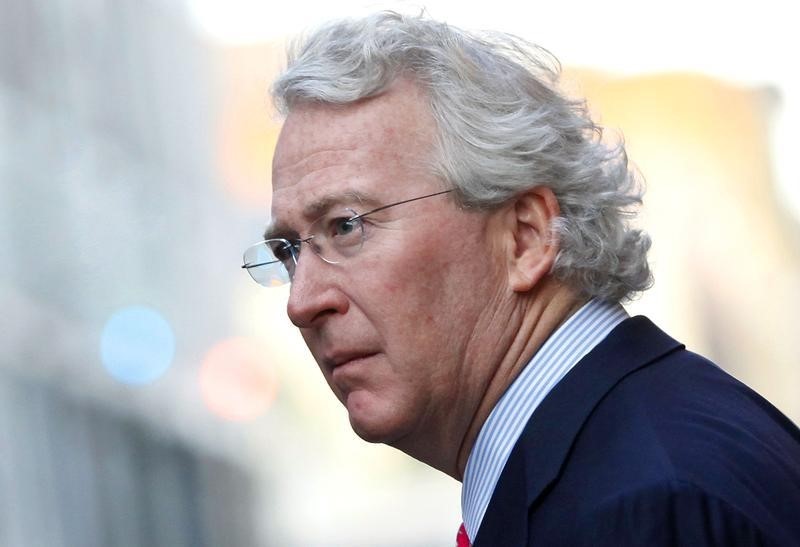By Brian Grow
OKLAHOMA CITY (Reuters) - Chesapeake Energy Corp filed suit Tuesday alleging its founder and former chief executive, Aubrey K. McClendon, stole confidential company data during his last months on the job in order to launch his new oil and gas empire.
McClendon, 55, "misappropriated highly sensitive trade secrets from Chesapeake" and "subsequently used these trade secrets for the benefit of" a company he founded in 2013, American Energy Partners LP, according to the civil complaint filed by Chesapeake (N:CHK) in Oklahoma County District Court.
In the suit, Chesapeake claims that McClendon asked his assistant to print maps and data about unleased acreage and that McClendon also sent himself blind copies of the same documents at a personal email address during his last months at the company. The company says it discovered McClendon's actions through a forensic analysis of his Chesapeake email account.
Chesapeake alleges the information was used by McClendon and American Energy Partners to acquire drilling rights on land in the Utica Shale formation in four separate transactions.
In a statement, McClendon characterized the lawsuit as baseless and said his severance agreement with the company included "the right to own and use this information." He said he intended to vigorously contest the lawsuit.
The suit represents the latest drama in the very public falling out between McClendon and Chesapeake, the company he co-founded in 1989 and built into the second largest natural gas producer in the United States. During his tenure at Chesapeake, McClendon was hailed as a visionary who helped pioneer the drilling technique known as hydraulic fracturing, or fracking.
In 2012, a series of Reuters investigations found that McClendon had taken but not publicly disclosed $1.55 billion in personal loans from a major financier of the company. He helped run a hedge fund to personally trade oil and gas. And emails reviewed by the news agency showed McClendon collaborated with a rival firm in a bid to suppress land prices in a prospective oil and gas play in Michigan.
Although an internal investigation of his activities found no "intentional" wrongdoing, McClendon agreed to step down as CEO on Jan. 29, 2013.
"Approximately thirty-six hours after the announcement of his departure," Chesapeake alleges in its complaint, McClendon began to take confidential company information.
Among the documents were "open acreage reports" about the Utica Shale formation, an oil and gas play in Ohio, Chesapeake alleges. The reports, which Chesapeake claims were confidential and expensive to compile, contain information about unleased land that the company was "pursuing and seeking to acquire," the suit contends.
As part of his employment agreement, McClendon was allowed to invest in each of Chesapeake's wells. When he left the company, McClendon retained those stakes, which were characterized as "jointly owned interests," and his separation agreement spells out information to which he is entitled.
Chesapeake alleges that McClendon strayed far beyond the bounds of the agreement. "Open acreage which has not even been acquired is, by definition, not 'jointly owned'," according to Chesapeake's complaint. The company contends McClendon had no right to take that information
"We believe that pursuing these legacy claims is in the best interest of the company and its shareholders," Chesapeake spokesman Gordon Pennoyer said in a statement.
According to the suit, McClendon "used and disclosed Chesapeake's trade secret and confidential information" to solicit investors for his new endeavor even as he served as a Chesapeake director and CEO in February and March 2013. "These investors knew or should have known that McClendon owed a duty to Chesapeake to maintain the secrecy of the information," the lawsuit claims.
Seven months after McClendon left Chesapeake, a Utica-focused affiliate of his American Energy Partners issued an announcement: the unit had raised $1.7 billion in equity and debt commitments from investment firms. The money would be used to acquire 110,000 acres in the Utica and launch drilling operations, according to a company news release.
McClendon's backers include Energy & Minerals Group, a Houston-based investment firm run by John Raymond, which has invested more than $3 billion. EMG and other investors could now become entangled in the litigation. Raymond could not immediately be reached for comment Tuesday.
In addition to American Energy Partners, three affiliates and McClendon Energy Operating, Chesapeake's complaint names "John Doe Investors 1-20" as defendants. McClendon is not named as a defendant in the complaint because resolution of disputes between him and Chesapeake requires arbitration, according to his separation agreement.
Chesapeake is seeking an unspecified amount of damages for alleged violations of the Oklahoma Uniform Trade Secrets Act and other state statutes. Chesapeake also is asking the Oklahoma County court to force McClendon's company to place "all income earned from their Utica Shale play acquisitions" in a trust. Chesapeake contends that any income earned by American Energy Partners resulted from "the use of Chesapeake property and the usurpation of Chesapeake's corporate opportunities."

In a statement on Tuesday afternoon responding to Chesapeake's lawsuit, American Energy-Utica and Energy & Minerals Group, the largest equity investor in AEU, said in a statement, "The allegations in the Chesapeake lawsuit against AEU are meritless." All the information used by AEU to buy assets, the statement said, was either publicly available, provided by the sellers of the assets, or independently developed by EMG or a petroleum engineering firm it had hired.